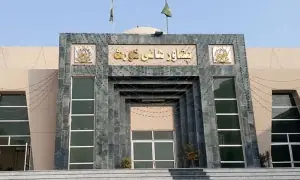Pakistan aims to privatise PIA, outsource Islamabad airport in Nov: Aurangzeb
3 min readPakistan is hoping to finalise both the delayed privatisation of its flag carrier and the outsourcing of Islamabad’s international airport in November, the country’s finance minister said Wednesday.
Muhammad Aurangzeb, who took office earlier this year, spoke to AFP at the World Bank’s headquarters in Washington, where he is attending the annual meetings of the International Monetary Fund and the World Bank.
During a previous interview with AFP in April, Aurangzeb had said he hoped the privatization of the government-owned Pakistan International Airlines (PIA) could be completed by June 2024.
Speaking Wednesday, the finance minister said the five-month delay was down to two factors: ensuring macroeconomic stability, and doing the proper due diligence of the interested parties.
“The reality is, when any foreign investor comes in, or even the local investor, who are going to put in a substantial amount of money, they want to ensure that the foundation is there,” he said, referring to macroeconomic factors.
Aurangzeb noted that potential bidders for both PIA and Islamabad airport also required scrutiny, another factor in the delay.
“Therefore it’s ultimately the cabinet which approved the extension in the timelines so people can do their due diligence before they make these submissions,” he said.
Brink of default
Aurangzeb said Pakistan had been behind on existing profit and dividend repayments when the current government took office, and had taken steps to remedy that after making progress on macroeconomic stability.
The country came to the brink of default last year as the economy shrivelled amid political chaos following catastrophic 2022 monsoon floods and decades of mismanagement, as well as a global economic downturn.
Inflation peaked at 38 per cent, but has since dropped to less than seven per cent, after the central bank maintained sky-high interest rates, amid other government tightening measures, including import bans to preserve foreign exchange.
Last month, the IMF approved a $7 billion loan, Pakistan’s 24th such payout from the multilateral lender since 1958.
Aurangzeb touted progress on the country’s current account deficit and the stabilisation of the Pakistani rupee, which has depreciated against the US dollar by about 65 per cent since 2020.
“In May and June on the back of this macroeconomic stability and building up on our reserves, we paid more than $2 billion to our existing international investors,” he said.
Pakistan’s gross public debt currently stands at 69 per cent of GDP, according to the IMF, or roughly $258 billion.
‘Saturation point’
Alongside privatizing state-owned enterprises (SOEs), Pakistan’s IMF deal also rests on increasing its tax base, and reforming of the country’s power sector.
Aurangzeb told AFP there was a common theme between all three major issues.
“Tax, power, SOE: There’s leakage, there’s theft, there’s corruption, right?” he said. “And we have to deal with all of that.”
Also, read this
Pakistan delays bidding for PIA as ministry approves new date
Dar says ‘significant progress’ made in resuming PIA flights to and from UK
But he dismissed media reports that the government was not serious about broadening its tax base, saying that the tax take had risen by 29 per cent in the last fiscal year, which overlapped with a prior caretaker government, and was targeted to rise by a further 40 per cent in the current fiscal year.
In a nation of more than 240 million people where most jobs are in the informal sector, only 5.2 million filed income tax returns in 2022.
“People who are not paying up, they need to start paying for the simple reason that we have reached a saturation point of the people who are paying,” he said.
“The salaried class, the manufacturing industry, reached a saturation point. And this cannot go forward,” he added.
The government was also committed to doing a better job of taxing certain sectors of the economy, he said, naming real estate, retail, retail distributors, and agriculture.
For the latest news, follow us on Twitter @Aaj_Urdu. We are also on Facebook, Instagram and YouTube.



























Comments are closed on this story.